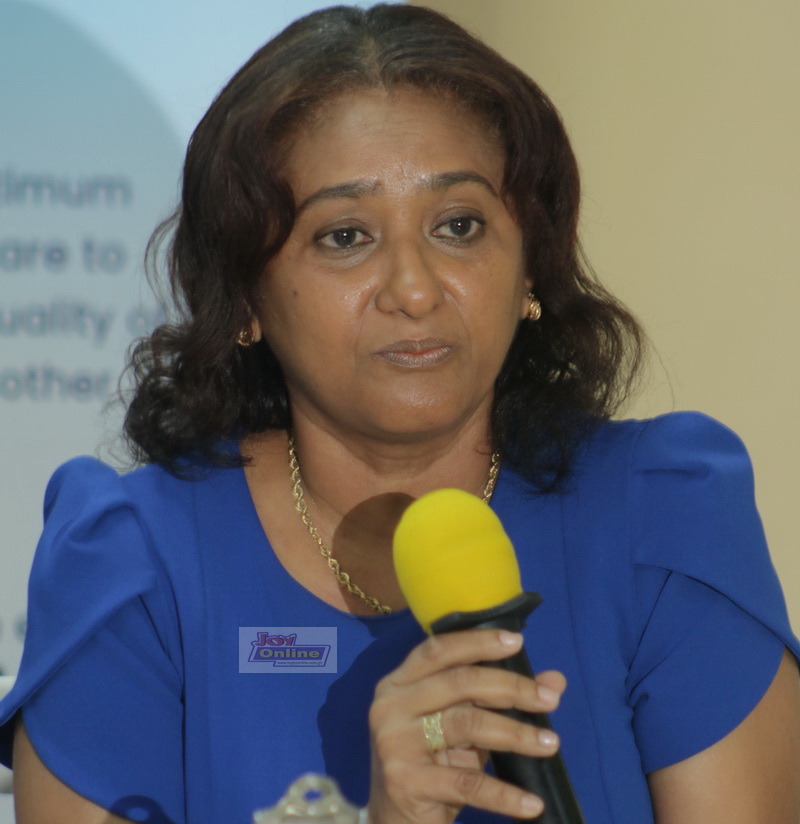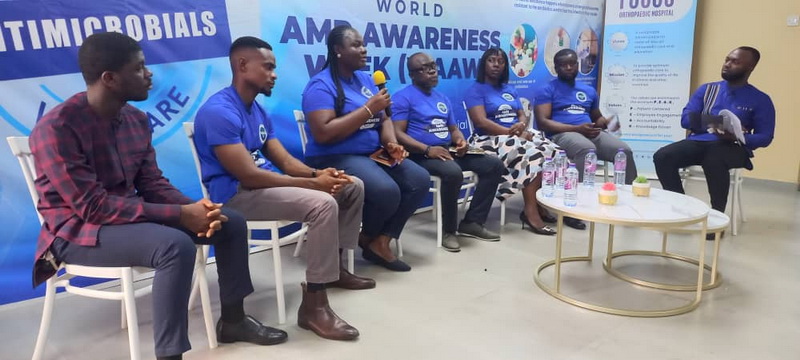Health experts at a forum organised by the FOCOS Orthopaedic Hospital in Accra, have called for concerted efforts at reversing the menace posed by Antimicrobial Resistance (AMR) in Ghana.
According to the experts, AMR poses a rather high threat to all the gains the country has made in the health sector, for which reason its ‘huge prevalence’ both in Ghana and globally, should engender behavioural change at the national and domestic levels.
The forum to mark AMR Week, held on the theme ‘Preventing Antimicrobial Resistance Together’ and also streamed to hundreds of others via Facebook, aimed to highlight the concept of resistance and the inherent dangers of drug misuse and overuse.
Dr. Francis Addai, Family Physician and Octetologist, and also Head of Medical Services at FOCOS Hospital, said with antimicrobial infections, patients stay longer in hospitals yet their health hardly improves even when established medications are administered for the treatment of specified conditions.
He said an estimated 4.95 million deaths are associated with AMR bacterial globally annually, hence the clarion call by the World Health Organisation for nations to do something about it.
“In the year 2019 alone, specifically, bacterial antimicrobial resistance contributed to about 2.47 million deaths globally, just the bacteria aspect, leaving out viral deaths, leaving out fungi deaths…”, he explained.
According to him, majority of the deaths occurred in middle and lower-income countries, like Ghana.
Benjamin Ampadu, Head of Pharmacy at FOCOS, who stressed that illnesses have become difficult to treat as a result of AMR, also highlighted the need for action, saying that even though the phenomenon is a naturally occurring process, human behaviour and activities have expedited it.

He defined AMR as the situation when micro-organisms including bacteria, viruses, fungi and parasites over time change and no longer respond to medications they were previously responding to.
Mr. Ampadu said while it was acceptable for drugs to lose their efficacy over time because bacteria or viruses may have become resistant to them, a 50-year buffer in the past has whittled to only two years currently. He cited the example of Chloroquine, previously used in the treatment of malaria but now abandoned, because it is no longer effective for the treatment of malaria.
He said when bacteria overcome medications, there is an urgent need for the development of new drugs, explaining that “When this happens, infections now become very difficult to treat, or impossible to treat.”
A Public Health Nurse Specialist, Bismark Adams, said while data on AMR-related deaths in Ghana may not be readily available, it’s prevalence is known to be high globally, saying about 2.8 million people in the US get AMR infections each year, out of which 35,000 people die annually.
He said in Ghana for instance, a study showed that there was about 70 percent resistance in common and affordable antibiotics that are in wide use in the country.
Recommendations
The Nurse Manager (Inspection, Prevention and Control) at FOCOS, Claudia Wireko-Tei, said everyone needs to prevent themselves from contracting any form of sickness, and one of the best ways to achieve that is for all to practice respiratory etiquette and regular handwashing.
She said environmental cleanliness, use of face-mask, and proper medical waste management are all issues to be taken seriously, explaining that healthcare professionals for instance, may worsen the plight of their patients if hands and tools are not adequately sanitised. She also called for the safe management of water bodies and human systems.
Other panelists said while simple colds for instance can easily be treated without a resort to medications, people procure and abuse antibiotics in the name of treating the cold. There are others who will not complete the full course of prescribed medications, which is inappropriate, as the disease-causing agents may not be destroyed, but may return stronger and resistant to the medication.
There was counsel also for pharmacists to stay in their pharmacies to enable them to properly probe and counsel persons walking in to purchase drugs, while the sick may also visit the pharmacist and describe their conditions for appropriate diagnosis and prescription, rather than self-medicating.
The Forum agreed that vaccination was one of the surest ways of protection from infections for both children and adults, and while vaccinations against many conditions abound for adults, it is not yet a popular practice.
Dr. Gifty Boateng, Head of the National Public Health & Reference Laboratory of the Ghana Health Service, said the challenge could be financial, as vaccination for adults is an out-of-pocket funded activity, unlike childhood vaccinations that are funded mainly by Ghana’s development partners and are therefore very popular.
She said a national policy is in the offing to develop an integrated approach to galvanising national efforts to further create awareness, surveillance and research to help the country be on top of the issues.

The Chief Executive Officer of the FOCOS Orthopaedic Hospital, Dr. Irene Adorkor Wulff, said it is very alarming that bacteria, viruses and fungi are becoming resistant to last resort medications, hence the need to resort to Antimicrobial Stewardship, “doing things to make sure that we use these medications in the best ways possible. It includes making smart choices about when to use them, which ones to use, how much to use, how to take them, and for how long. We at FOCOS Orthopaedic Hospital have heeded the call of the World Health Organisation to get involved in Antimicrobial Stewardship.
“This serves as a guide to help us to use these life-saving medications the right way, and fight against the chronic problem of Antimicrobial Resistance…Let’s not make it easy for the quacks to outsmart us because that will be a disaster.”
Latest Stories
-
Africa Food Systems Parliamentary Network urges governments to increase investment in agriculture
32 minutes -
AU and partners urge youth to get involved in efforts to transform continent’s food systems
39 minutes -
Fire kills 3-year-old at Asawase-Dagomba Line in Ashanti Region
1 hour -
Paskal A.B. Rois: How Mahama inspires me
1 hour -
Complete abandoned projects in Akatsi North District – Chiefs to Mahama
2 hours -
Painter and sculptor B. Acheampong turning his passion for art into profitable venture
2 hours -
Presidential lodge, RM residency in Ashanti region left to rot away
3 hours -
Herty Corgie highlights the essence of gratefulness in ‘My Gratitude’
5 hours -
ANNOUNCEMENT: Joy FM temporarily goes off air January 11
5 hours -
Yango honored with two titles at the Technovation Africa Awards 2024
5 hours -
Aowin Traditional Council declares war on illegal mining with spiritual intervention
5 hours -
Leadership must ensure equity for all citizens, regardless of faith – Asiedu Nketiah
5 hours -
Prof. Alex Manu appointed Executive Director at Centre for Social Justice
5 hours -
Imminent changes within some key security agencies, state institutions, and its implications
5 hours -
There are more women than men, but there’s a man for every woman – Rev. Nana Yaa
6 hours

